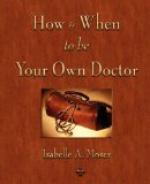Few proteins are water soluble. When we eat proteins the digestive apparatus must first break them down into their water-soluble components, amino acids, so these can pass into the blood and then be reassembled into the various proteins the body uses. The body has an interesting mechanism to digest proteins; it uses enzymes. An enzyme is like the key for a lock. It is a complex molecule that latches to a protein molecule and then breaks it apart into amino acids. Then the enzyme finds yet another protein molecule to free. Enzymes are efficient, reusable many many times.
Enzymes that digest proteins are effective only in the very acid environment of the stomach, are manufactured by the pancreas and are released when protein foods are present. The stomach then releases hydrochloric acid and churns away like a washing machine, mixing the enzymes and the acid with the proteins until everything has digested.
So far so good. That’s how its supposed to be. But. Dr. Henry Bieler, who wrote Food Is Your Best Medicine, came up with the finest metaphor I know of to explain how protein digestion goes wrong. He compared all proteins to the white of an egg (which is actually a form of protein). When raw and liquid, the long chains of albumen (egg white) proteins are in their natural form. However, cook the egg and the egg white both solidifies and becomes smaller. What has happened is that the protein chains have shriveled and literally tied themselves into knots. Once this happens, pancreatic enzymes no longer fit and cannot separate all the amino acids. Cooked proteins may churn and churn and churn in the presence of acid and pancreatic enzymes but they will not digest completely. Part becomes water soluble; part does not.
But, indigestible protein is still subject to an undesirable form of consumption in the gut. Various bacteria make their home in our airless, warm intestines. Some of these live on protein. In the process of consuming undigested proteins, they release highly toxic substances. They poison us.
What is true of the white of an egg is also true of flesh foods and dairy. Raw meat and raw fish are actually easily digestible foods and if not wrongly combined will not produce toxemia in a person that still has a strong pancreas. However, eating raw meat and fish can be a dicey proposition, both for reasons of cultural sensibility (people think it is disgusting) and because there may be living parasites in uncooked flesh that can attack, sicken and even kill people. It has been argued that a healthy stomach containing its proper degree of acidity provides an impenetrable barrier to parasites. Perhaps. But how many of us are that healthy these days? Cooked flesh and fish seems more delicious to our refined, civilized sensibilities, but are a poor food.




